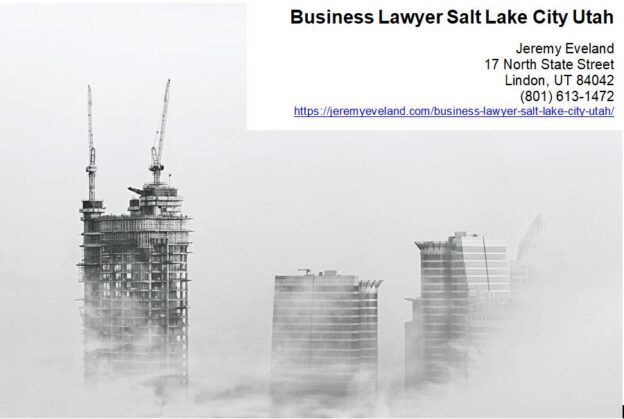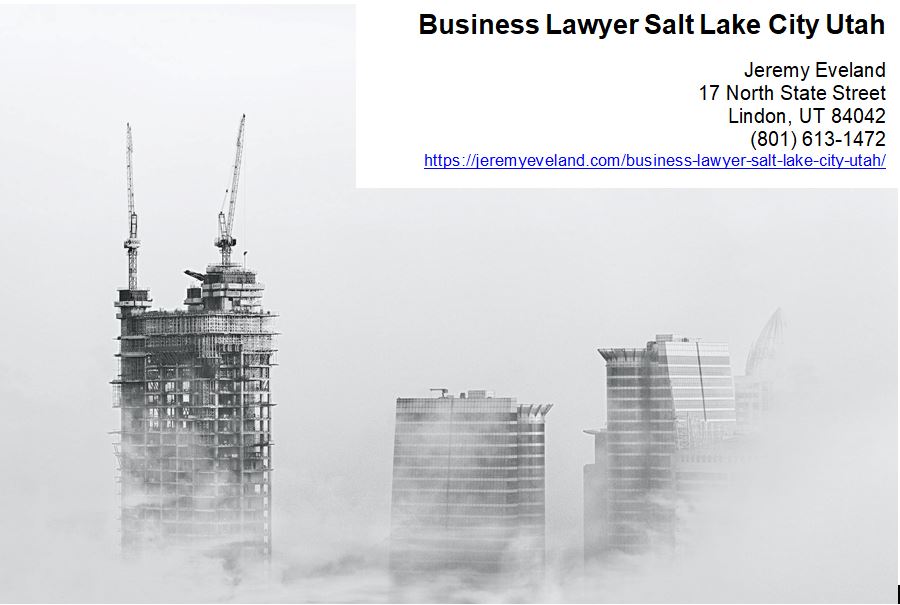Business Lawyer Salt Lake City Utah
If you have arrived on this page you probably need to hire a business lawyer near Salt Lake City Utah. Whether you need help with litigation, contracts, or general counsel, consider contacting attorney Jeremy Eveland to assist you as your lawyer.
Salt Lake City, Utah is home to many successful business lawyers. With the city’s booming economy, there is an increasing need for attorneys who specialize in business law. Business attorneys are responsible for helping businesses and corporations with the legal aspects of operating in the state. They provide legal advice, research, and other services related to business transactions and disputes. Jeremy Eveland regularly helps businesses as a consultant, lawyer, and a trusted advisor regarding business succession.
Business is defined by Black’s Legal Dictionary as “A commercial enterprises carried on for profit; a particular occupation or employment habitually engaged in for livelihood or gain.” page 157.
Lawyer is defined by Black’s Legal Dictionary as both a verb and a noun. When a noun it is “one who is licensed to practice law.” When a verb, it is “1. to practice as a lawyer
Business lawyers in Salt Lake City, Utah are highly educated professionals who have completed a rigorous path of study and training. Most business lawyers in the area have a degree from a law school, and many have attended a school accredited by the American Bar Association. In addition to their formal education, many business attorneys in the city have also completed additional courses in specialized areas such as tax law or corporate law.
The job of a business lawyer in Salt Lake City, Utah involves providing legal advice to clients on a variety of matters related to business and the law. This includes helping businesses with the formation of corporations and limited liability companies, contract negotiation and drafting, and disputes between business owners, clients, and other entities. Business lawyers also provide strategic advice to clients on a variety of legal issues and help them navigate the complex world of corporate law. We can usually help corporations and LLCs with the follow:
Business Organizations
Contract Law
Intellectual Property
Real Estate Law
Antitrust Law
Employment Law
Securities Law
International Business Law
Consumer Law
In addition to providing legal advice, business lawyers in Salt Lake City are also responsible for researching and analyzing legal documents, conducting legal research, and preparing documents and pleadings for court proceedings. They may also represent clients in court and work with other attorneys to prepare for litigation and trial. Many business lawyers also have their own blog sites where they post updates and advice on legal topics and current issues.
Business lawyers in Salt Lake City are also highly sought after for their expertise in commercial and insurance law. Many business owners turn to business lawyers for advice on how to protect their business from potential legal issues, as well as for help with insurance coverage cases. Business lawyers are also experienced in dealing with litigation, including representing clients in federal court and before the state’s bar association. In addition to providing legal advice, business lawyers in Salt Lake City also provide strategic advice to clients on a variety of legal issues, helping them make informed decisions about their businesses.
Jeremy Eveland is considered by some to be among the leading law firms in Salt Lake City, Utah that focuses in on business law. Jeremy Eveland is an experienced attorney who has many years of experience in the field. Mr. Eveland has obtained verdicts in insurance cases and has been involved in several cases over the years. The firm also represents a wide range of personal clients and businesses, handling a variety of legal issues, from global risks working with the director of global assets to the COO, CFO, and CEO of different companies and their subsidiaries. Some areas of business law include representation of:
Construction Companies
Landscape Companies
General Contractors
Subcontractors
Manufacturing Companies
Concrete Businesses
Direct to Consumer Businesses
Business to Business Sales Companies
Medical Devices Companies
and many more.
At the law firm, the attorney strives to provide the highest quality legal representation to all clients. The firm’s attorneys are dedicated to providing clients with the best legal advice, as well as strategic advice on how to handle their legal issues based on their specific circumstances. There simply are no cookie cutter answers in business law. They are also committed to providing their clients with a comprehensive understanding of business law, as well as their rights and responsibilities as business owners, including intellectual property rights, contract rights, HR and OSHA matters.
If you are in need of legal advice, the Jeremy Eveland may be able help. The firm offers a range of services, including helping clients with the formation of business entities and partnerships, contract negotiations and drafting, and disputes between business owners and other entities. Depending on the case, the firm may provide legal representation in court and provides strategic advice on a variety of legal issues, including corporate law, intellectual property law, employment and labor law, and franchisees. Mr. Eveland primarily acts as general counsel for his business clients in Salt Lake City.
If you are a business owner in Salt Lake City, Utah Mr. Eveland may be the right attorney for you. The firm’s attorneys are committed to providing the highest quality of legal services to their clients, from providing advice to researching and analyzing legal documents. The firm is also involved in a variety of continuing legal education courses to keep all attorneys up to date on the latest developments in the field.
Business Lawyer Salt Lake City Utah Consultation
When you need legal help with transactional law in Utah, call Jeremy D. Eveland, MBA, JD (801) 613-1472.
Jeremy Eveland
17 North State Street
Lindon UT 84042
(801) 613-1472
Recent Posts
The Utah Uniform Partnership Act
The 10 Essential Elements of Business Succession Planning
Business Transaction Lawyer Salt Lake City Utah
Business Succession Lawyer Salt Lake City Utah
Business Succession Lawyer West Jordan Utah
Business Succession Lawyer St. George Utah
Business Succession Lawyer West Valley City Utah
Business Succession Lawyer Provo Utah
Business Succession Lawyer Sandy Utah
Business Succession Lawyer Orem Utah
Business Succession Lawyer Ogden Utah
Business Succession Lawyer Layton Utah
Business Succession Lawyer South Jordan Utah
Business Succession Lawyer Lehi Utah
Salt Lake City
|
Salt Lake City, Utah
|
|
|---|---|
| City of Salt Lake City[1] | |

Clockwise from top: The skyline in July 2011, Utah State Capitol, TRAX, Union Pacific Depot, the Block U, the City-County Building, and the Salt Lake Temple
|
|
| Nickname:
“The Crossroads of the West”
|
|

Interactive map of Salt Lake City
|
|
| Coordinates: 40°45′39″N 111°53′28″WCoordinates: 40°45′39″N 111°53′28″W | |
| Country | |
| State | Utah |
| County | Salt Lake |
| Platted | 1857[2] |
| Named for | Great Salt Lake |
| Government
|
|
| • Type | Strong Mayor–council |
| • Mayor | Erin Mendenhall (D) |
| Area | |
| • City | 110.81 sq mi (286.99 km2) |
| • Land | 110.34 sq mi (285.77 km2) |
| • Water | 0.47 sq mi (1.22 km2) |
| Elevation
|
4,327 ft (1,288 m) |
| Population | |
| • City | 200,133 |
| • Rank | 122nd in the United States 1st in Utah |
| • Density | 1,797.52/sq mi (701.84/km2) |
| • Urban
|
1,021,243 (US: 42nd) |
| • Metro
|
1,257,936 (US: 47th) |
| • CSA
|
2,606,548 (US: 22nd) |
| Demonym | Salt Laker[5] |
| Time zone | UTC−7 (Mountain) |
| • Summer (DST) | UTC−6 |
| ZIP Codes | |
| Area codes | 801, 385 |
| FIPS code | 49-67000[7] |
| GNIS feature ID | 1454997[8] |
| Major airport | Salt Lake City International Airport |
| Website | Salt Lake City Government |
Salt Lake City (often shortened to Salt Lake and abbreviated as SLC) is the capital and most populous city of Utah, as well as the seat of Salt Lake County, the most populous county in Utah. With a population of 200,133 in 2020,[10] the city is the core of the Salt Lake City metropolitan area, which had a population of 1,257,936 at the 2020 census. Salt Lake City is further situated within a larger metropolis known as the Salt Lake City–Ogden–Provo Combined Statistical Area, a corridor of contiguous urban and suburban development stretched along a 120-mile (190 km) segment of the Wasatch Front, comprising a population of 2,606,548 (as of 2018 estimates),[11] making it the 22nd largest in the nation. It is also the central core of the larger of only two major urban areas located within the Great Basin (the other being Reno, Nevada).
Salt Lake City was founded July 24, 1847, by early pioneer settlers, led by Brigham Young, who were seeking to escape persecution they had experienced while living farther east. The Mormon pioneers, as they would come to be known, entered a semi-arid valley and immediately began planning and building an extensive irrigation network which could feed the population and foster future growth. Salt Lake City’s street grid system is based on a standard compass grid plan, with the southeast corner of Temple Square (the area containing the Salt Lake Temple in downtown Salt Lake City) serving as the origin of the Salt Lake meridian. Owing to its proximity to the Great Salt Lake, the city was originally named Great Salt Lake City. In 1868, the word “Great” was dropped from the city’s name.[12]
Immigration of international members of The Church of Jesus Christ of Latter-day Saints, mining booms, and the construction of the first transcontinental railroad initially brought economic growth, and the city was nicknamed “The Crossroads of the West”. It was traversed by the Lincoln Highway, the first transcontinental highway, in 1913. Two major cross-country freeways, I-15 and I-80, now intersect in the city. The city also has a belt route, I-215.
Salt Lake City has developed a strong tourist industry based primarily on skiing and outdoor recreation. It hosted the 2002 Winter Olympics. It is known for its politically progressive and diverse culture, which stands at contrast with the rest of the state’s conservative leanings.[13] It is home to a significant LGBT community and hosts the annual Utah Pride Festival.[14] It is the industrial banking center of the United States.[15] Salt Lake City and the surrounding area are also the location of several institutions of higher education including the state’s flagship research school, the University of Utah. Sustained drought in Utah has more recently strained Salt Lake City’s water security and caused the Great Salt Lake level drop to record low levels,[16][17] and impacting the state’s economy, of which the Wasatch Front area anchored by Salt Lake City constitutes 80%.[18]
[geocentric_weather id=”79414f66-9f4c-4a1a-9eaa-8bbae65c0683″]
[geocentric_about id=”79414f66-9f4c-4a1a-9eaa-8bbae65c0683″]
[geocentric_neighborhoods id=”79414f66-9f4c-4a1a-9eaa-8bbae65c0683″]
[geocentric_thingstodo id=”79414f66-9f4c-4a1a-9eaa-8bbae65c0683″]
[geocentric_busstops id=”79414f66-9f4c-4a1a-9eaa-8bbae65c0683″]
[geocentric_mapembed id=”79414f66-9f4c-4a1a-9eaa-8bbae65c0683″]
[geocentric_drivingdirections id=”79414f66-9f4c-4a1a-9eaa-8bbae65c0683″]
[geocentric_reviews id=”79414f66-9f4c-4a1a-9eaa-8bbae65c0683″]








